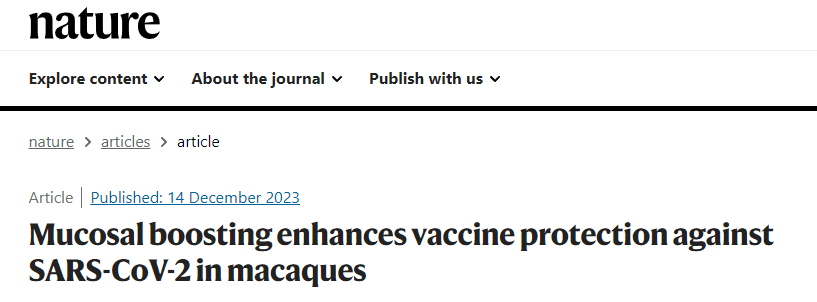- Sie haben noch keine Artikel in Ihrem Warenkorb.
Mucosal boosting enhances vaccine protection against SARS-CoV-2 in macaques (News)

Abstract
A limitation of current SARS-CoV-2 vaccines is that they provide minimal protection against infection with current Omicron subvariants1,2, although they still provide protection against severe disease. It has been hypothesized that enhanced mucosal immunity will be required to block infection and onward transmission. Intranasal administration of current vaccines has proven inconsistent3-7, suggesting that alternative immunization strategies may be required. Here we show that intratracheal boosting with a bivalent Ad26 based SARS-CoV-2 vaccine results in substantial induction of mucosal humoral and cellular immunity and near complete protection against SARS-CoV-2 BQ.1.1 challenge. 40 previously immunized rhesus macaques were boosted with a bivalent Ad26 vaccine by the intramuscular, intranasal, and intratracheal routes or with a bivalent mRNA vaccine by the intranasal route. Ad26 boosting by the intratracheal route led to substantial expansion of mucosal neutralizing antibodies, IgG and IgA binding antibodies, and CD8+ and CD4+ T cell responses, which exceeded those induced by Ad26 boosting by the intramuscular and intranasal routes. Intratracheal Ad26 boosting also led to robust upregulation of cytokine, NK, T and B cell pathways in the lung. Following high-dose SARS-CoV-2 BQ.1.1 challenge, intratracheal Ad26 boosting provided near complete protection, whereas the other boosting strategies proved less effective. Protective efficacy correlated best with mucosal humoral and cellular immune responses. These data demonstrate that novel immunization strategies induce robust mucosal immunity, suggesting the feasibility of developing vaccines that block respiratory viral infections.
Author information
Author notes
- These authors contributed equally: Katherine McMahan, Frank Wegmann, Malika Aid, Michaela Sciacca, Jinyan Liu, Nicole P. Hachmann, Jessica Miller, Catherine Jacob-Dolan, Olivia Powers, David Hope, Roland C. Zahn, Dan H. Barouch
Authors and Affiliations
- Center for Virology and Vaccine Research, Beth Israel Deaconess Medical Center, Boston, MA, USAKatherine McMahan, Malika Aid, Michaela Sciacca, Jinyan Liu, Nicole P. Hachmann, Jessica Miller, Catherine Jacob-Dolan, Olivia Powers, David Hope, Cindy Wu, Juliana Pereira, Tetyana Murdza, Camille R. Mazurek, Amelia Hoyt & Dan H. Barouch
- Janssen Vaccines and Prevention B.V., Leiden, NetherlandsFrank Wegmann, Jeroen Tolboom, Jan Serroyen, Laura Solforosi, Lea M. M. Costes & Roland C. Zahn
- Ragon Institute of MGH, MIT, and Harvard, Cambridge, MA, USACatherine Jacob-Dolan & Dan H. Barouch
- Washington University School of Medicine, Saint Louis, MO, USAAdrianus C. M. Boon
- Emory School of Medicine, Atlanta, GA, USAMeredith Davis-Gardner & Mehul S. Suthar
- Tufts University Cummings School of Veterinary Medicine, North Grafton, MA, USAAmanda J. Martinot
- Bioqual, Rockville, MD, USAMona Boursiquot, Anthony Cook, Laurent Pessaint, Mark G. Lewis & Hanne Andersen
Quelle: nature
Den ersten Kommentar schreiben.
Antworten
Sie müssen eingeloggt sein, um einen Kommentar zu schreiben.


